
Preparing the Region for Pre-Exposure Prophylaxis (PrEP)Regional Stakeholders facilitate Three-Day PrEP Training for Health Care Providers In Belize
Friday, 25 February 2022 (PANCAP Coordinating Unit, CARICOM Secretariat): The Pan-Caribbean Partnership against HIV and AIDS (PANCAP), the mechanism that provides a structured and unified approach to the Caribbean’s response to the HIV epidemic, collaborated with regional stakeholders for a three-day capacity building activity for health care providers in Belize on the Clinical Management of Pre-exposure Prophylaxis (PrEP) for serodiscordant couples and Key Populations.
Pre-exposure Prophylaxis (PrEP) is the use of antiretroviral (ARV) drugs by persons without HIV infection to prevent the acquisition of HIV.
It is an effective prevention strategy that is recommended to reduce HIV infections, especially in Men who have sex with men (MSM), Sex Workers and the Transgender population.
The training was implemented in collaboration with the Pan American Health Organisation (PAHO), Ministry of Health and Wellness and the National AIDS Commission (NAC), Belize.
Health care providers were emersed in an in-depth discussion on the most recent World Health Organisation (WHO) recommendations on PrEP, Non-occupational HIV Post-Exposure Prophylaxis (nPEP) and new scientific evidence and implementation data emerging from the field.
Participants were also exposed to WHO guidance on PrEP programming. In addition, the capacity building activity provided a space for participants to share experiences as Belize prepares for PrEP and nPEP implementation.
Mr Enrique Romero, Executive Director, National AIDS Commission (NAC) Secretariat, Belize, highlighted that PrEP is a key implementation strategy for HIV prevention under Belize’s HIV National Strategic Plan (NSP). He also stated that Belize would be implementing a PrEP pilot programme in 2022, and the capacity building exercise would be integral to the pilot’s success.
The Executive Director further emphasised that the involvement of civil society organisations would be at the core of the PrEP implementation, specifically concerning awareness and education for Key Populations.
Ms Sandra Jones, Technical Advisor HIV/STI, TB & Viral Hepatitis, PAHO/WHO – Subregional Program Coordination, Caribbean, underscored the significance of the training activity as more countries in the Region commence PrEP implementation. Antigua and Barbuda, Belize and Guyana have joined four other countries that have established PrEP services, including The Bahamas, Barbados, Haiti and Jamaica.
Ms Jones further highlighted that PAHO and PANCAP collaborated on the development of training materials, guidelines and videos for capacity building within National HIV Programmes to ensure the standardisation of PrEP training materials for the Region. In addition, information, education and communication products were developed for community health promotion, including brochures and social media posters accessible via the PANCAP website.
The PrEP training activities were supported by the Multi-country Caribbean grant for PANCAP, Caribbean Vulnerable Communities Coalition (CVC) and Centro de Orientación e Investigación Integral (COIN) via the Global Fund to Fight AIDS, Tuberculosis and Malaria.
– ENDS –
Contact:
Timothy Austin
Senior Project Officer, Communications
PANCAP Coordinating Unit
CARICOM Secretariat
Turkeyen, Greater Georgetown, Guyana
Email: taustin.consultant@caricom.org
Tel: (592) 222-0001-75, Ext. 3409 | Visit www.PANCAP.org
Helpful links:
What is PrEP?
https://www.paho.org/en/topics/combination-hiv-prevention/pre-exposure-prophylaxis-prep
WHAT IS PANCAP?
PANCAP is a Caribbean regional partnership of governments, regional civil society organisations, regional institutions and organisations, bilateral and multilateral agencies and contributing donor partners, which was established on 14 February 2001. PANCAP provides a structured and unified approach to the Caribbean’s response to the HIV epidemic, coordinates the response through the Caribbean Regional Strategic Framework on HIV and AIDS to maximise efficient use of resources and increase impact, mobilises resources and build capacity of partners.
WHAT IS PANCAP?
PANCAP is a Caribbean regional partnership of governments, regional civil society organisations, regional institutions and organisations, bilateral and multilateral agencies and contributing donor partners established on 14 February 2001. PANCAP provides a structured and unified approach to the Caribbean’s response to the HIV epidemic, and coordinates the response through the Caribbean Regional Strategic Framework on HIV and AIDS to maximise efficient use of resources and increase impact, mobilise resources and build the capacity of partners.
What are the Global AIDS Strategy 2021–2026 targets and commitments?
If targets and commitments in the strategy are achieved:
- The number of people who newly acquire HIV will decrease from 1.7 million in 2019 to less than 370 000 by 2025
- The number of people dying from AIDS-related illnesses will decrease from 690 000 in 2019 to less than 250 000 in 2025.
- The goal of eliminating new HIV infections among children will see the number of new HIV infections drop from 150,000 in 2019 to less than 22,000 in 2025.
What are the 95-95-95 Targets for ending AIDS?
- 95% of People Living with HIV know their HIV status;
- 95% of people who know their status on treatment; and
- 95% of people on treatment with suppressed viral loads.
HELPFUL LINKS:
Global AIDS Strategy 2021–2026, End Inequalities, End AIDS
https://pancap.org/pancap-documents/global-aids-strategy-2021-2026-end-inequalities-end-aids/
Caribbean Regional Strategic Framework on HIV and AIDS (CRSF) 2019-2025
https://pancap.org/pancap-documents/caribbean-regional-strategic-framework-2019-2025/
